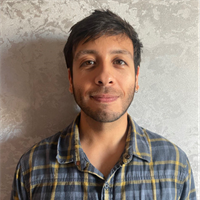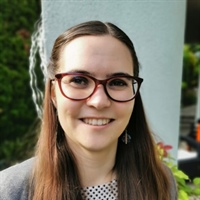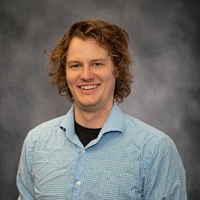SIAM Announces 2023 Recipients of the SIAM Postdoctoral Support Program
Society for Industrial and Applied Mathematics (SIAM) is pleased to announce the three recipients of the SIAM Postdoctoral Support Program, the first set of awardees in this newly-established program. Early career professionals Jimmie Adriazola, Gabriela Kováčová, and Jüergen Kritschgau each proposed a program of research collaboration with an established mentor in the SIAM community.
The SIAM Postdoctoral Support Program is made possible by gifts to the SIAM Postdoctoral Support Fund, which was established by Drs. Martin Golubitsky and Barbara Keyfitz. The program provides up to $15,000 in financial support for postdoctoral researchers to work with a mentor from a different institution in order to foster direct research experiences and professional development. Up to four postdoc/mentor pairs will be selected annually. The application will remain open until annual funding is expended, but the priority deadline for the next round of applications is November 1, 2024.
If you’d like to make a contribution to the SIAM Postdoctoral Support Fund, please click here. If you have any questions about giving to SIAM or would like to learn more about the ways that your gift can make a difference, please email Abby Addy, Director of Development and Corporate Relations, or contact her at (267) 648-3529.
Jimmie Adriazola, Southern Methodist University

Mentor: Panayotis Kevrekidis, University of Massachusetts, Amherst
Dr. Jimmie Adriazola is a National Science Foundation Mathematical and Physical Sciences Ascending Postdoctoral Fellow at the Moody School of Graduate and Advanced Studies and department of mathematics at Southern Methodist University. He received his Ph.D. in mathematical sciences from the New Jersey Institute of Technology (NJIT) and was previously a postdoctoral scholar at the University of California, Santa Barbara. His research has mostly been centered on optimal control of coherent waveforms with applications to quantum computing and nonlinear optics. More recently, he has taken an interest in data-driven science and scientific machine learning.
Q: What was the research proposed?
A: We will pursue dynamical reductions of nonlinear Schrodinger-type equations to build efficient control strategies that manipulate the dynamics in a technologically desirable way. In a second project, we will pursue connections between Koopman operator theory and integrable Hamiltonian systems to build efficient data-driven Hamiltonian methods for phenomena that may be modeled by nonlinear wave equations.
Q: How will this award help you achieve your career goals?
A: The generous support from the SIAM Postdoctoral Support Program allows me to establish a much stronger long-term collaboration with Professor Panayotis Kevrekidis. Together with my thesis advisor, Professor Roy Goodman at NJIT, we worked on a problem and wrote a paper remotely. Being able to meet in person to work together will help deepen my ties with Kevrekidis and greatly advance our progress and make our current research projects a higher priority. I hope that this research, which SIAM helps make possible, brings me closer to achieving a permanent and competitive position as an applied mathematician at a national lab or in academia.
Q: What do you most look forward to in working with your mentor?
A: Of course, having fun together on a project we both care about! Professor Kevrekidis is insightful and has so far had a great career as an applied mathematician. While on my visits to University of Massachusetts Amherst, I also hope to learn more about his overall process and how he thinks about constructing long-term research programs.
Gabriela Kováčová, University of California, Los Angeles

Mentor: Igor Cialenco, Illinois Institute of Technology
Gabriela Kováčová received her Ph.D. in November 2021 before joining the department of mathematics at University of California, Los Angeles as a Hedrick Assistant Adjunct Professor (postdoc) in the summer of 2023. Her doctoral thesis on the set-valued Bellman's principle was awarded the Stephan Koren Prize as well as the Dr. Maria Schaumayer Stiftung prize; she also received the 2021 SIAM Activity Group on Financial Mathematics and Engineering Conference Paper Prize. Her research interests are financial mathematics, stochastic control, and multi-objective and vector optimization.
Q: What was the research proposed?
A: In many real-world problems, true distributions of random quantities are not known precisely. For example, think of the distribution of assets returns on financial markets. We will use the SIAM Postdoctoral Support Program funding to explore incorporating model uncertainty into problems of financial mathematics with multiple objectives.
Q: How will this award help you achieve your career goals?
A: The SIAM Postdoctoral Support Program will allow me to work on exciting and promising new problems. I also hope to benefit from further contact with the experts of the SIAM Activity Group on Financial Mathematics and Engineering.
Q: What do you most look forward to in working with your mentor?
A: I look forward to in-person collaboration during the research visit(s) that will be possible thanks to this postdoc support program. Igor has also been very kind in sharing career advice during our previous meetings, so I am certain that I will benefit greatly from the collaboration.
Jüergen Kritschgau, Research Training Group, Portland State University

Mentor: Bill Kay, Pacific Northwest National Laboratory
Dr. Jüergen Kritschgau received his B.A. in mathematics and philosophy from Bates College in 2016, and his Ph.D. in mathematics from Iowa State University in 2021. His dissertation work focused on rainbow problems in groups and graphs. Currently, Dr. Kritschgau’s work focuses on hypergraph clustering, zero forcing, and the inverse eigenvalue problem for graphs.
Q: What was the research proposed?
A: We will apply information theoretic principles to compressions of graphs, hypergraphs, and directed graphs to develop clustering and ranking algorithms. Much of our work will involve testing our algorithms on real-world and synthetic data, as well as proving thresholds for the success of our algorithms.
Q: How will this award help you achieve your career goals?
A: My career goal is to work at a national lab. The SIAM Postdoctoral Support Program will enable me to achieve my career goals by supporting my collaboration with Dr. Kay on a variety of problems concerning community detection in graphs and hypergraphs. Furthermore, the award will support a unique mentor/postdoc relationship that bridges the divide between traditional academic and laboratory institutions.
Q: What do you most look forward to in working with your mentor?
A: I met Dr. Kay virtually at an AMS Mathematics Research Communities workshop, so I’m really excited to work on problems together in person.
Stay Up-to-Date with Email Alerts
Sign up for our monthly newsletter and emails about other topics of your choosing.



